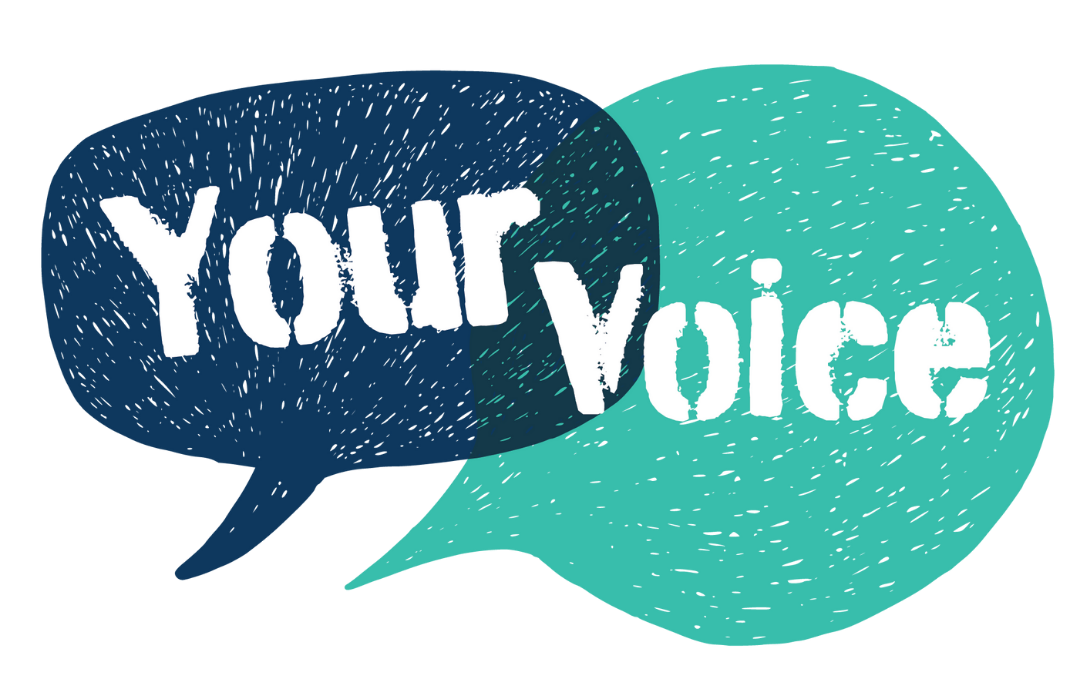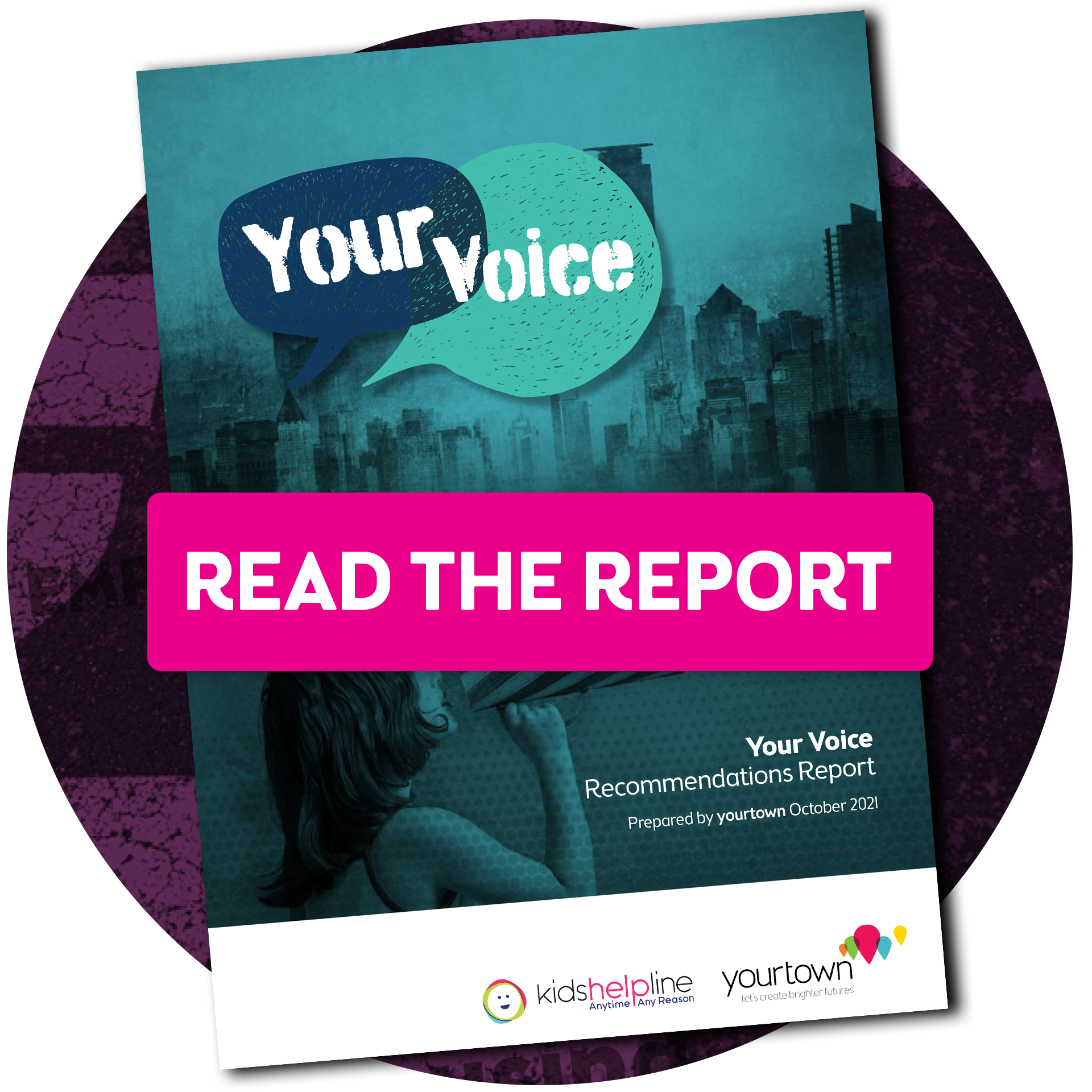Make your voice heard!
Your Voice is your way to have your say!
At Kids Helpline we're all about giving a voice to young people.
Your Voice does just that by handing the mic to young people aged 15-24 to have their say on government, mental health, education, employment and more.
Now that the project is wrapped up, our Youth Ambassadors have presented your ideas to the Federal Government.
Here's what young people had to say.

Your Snapshots
Check out the big issues you told us about:
Here's what you told us!
Young people got to learn more about...
- The role of the Federal Government
- The policy process and the ways decisions are made
- Ways young people can influence these
Young people from our Youth Advisory Groups worked on survey questions, assisted with identifying key issues and ideas, decided on the approaches and activities that are used and developed the final report and recommendations.
How it worked
Step 1
A national survey explored the views of young people regarding government services and policy.
Step 2
A national week-long online forum where 200 young people discussed key issues from the survey.
Step 3
A youth summit with 50 young people which identified appropriate actions and priorities for the government.
Step 4
Three Youth Ambassadors assisted with presenting the findings to the Federal Government!
According to the United Nations Convention on the Rights of the Child, you have the right to:
- Be heard
- Be informed
- Share views and have them taken into account
- Meet together to share your opinions and ideas
Other ways you can make your voice heard
- Voting
- Contacting Members of Parliament
- Petitions
- Being involved in committees
- Public meetings and protests
Through these different approaches you can either show support for the government or provide different views about the approach that has been taken.
Click on the links or keep scrolling to find out more about each approach!
Voting
All Australian citizens are eligible to vote in all Australian elections. You can enrol to vote once you turn 16, but cannot vote in an election until you are 18. Voting is compulsory in Australia and provides an opportunity to have your say on who represents you.
Before an election read up on the views of the different candidates on their website, social media or voting information that they send out. Reading this information will help you decide on which candidate or party will best represent your views.
While the candidate that you voted for may not get in every vote counts as it shows the elected representative the mix of views that are in their seat or area.
To enrol to vote contact the Australian Electoral Commission.
Contacting Members of Parliament (MP) or Council
Everyone is able to reach out and contact their member of Parliament. The addresses, phone number and email addresses are available on the parliamentary website or on their personal websites and Facebook pages.
You are also able to reach out and contact the Minister that is responsible for your area of interest, such as the Minister for Education and Youth.
By contacting your local MP you can:
- Make them aware of an issue in the community
- Express your opinion
- Ask them to do something
Just remember you may not have long to talk to them so be clear about your issue, remain factual and tell them what you want to happen.
If you’re unsure of who your Member of Parliament is you can look them up online.
Federal representatives can be found on the Parliament of Australia Website or through the AEC.
Petitions
Petitions are requests that are made by a group of people directly to Parliament about a specific action. A petition must provide information about an issue and the action that you would like to occur.
Once a petition has been written you want to get as many people as possible to sign the petition before it is sent to the Parliament. Petitions can be in paper form but e-petitions are becoming more common.
More details about surveys and templates can be found on the parliamentary website.
Current petitions can be seen at this link.
Committees
Committees are formed by Parliament to investigate ideas. They are made up of representatives from the government and opposition and usually have 6-10 members.
Committees investigate issues and the views of the community before reporting back to the government with evidence and recommendations. Any member of the public can make a submission to a committee once it has been formed.
After making a submission you can be asked to come and present to the committee and answer questions. You can also attend committee hearings in parliament, around Australia and sometimes online.
Details about committees, inquiries and current public hearings can be found on the Parliament of Australia website.
Public Meetings and Protests
There are many forms of community activism that people participate in. The most common forms of activism are public meetings and protests that are connected to a community campaign or group.
When holding a public meeting or protest you can invite local members to speak about the issue or hear the concerns of the community. The media can also be invited to create more interest about the issue that you are concerned about.
These campaigns can also include elements such as social media campaigns, contacting the media and the development of petitions. An organised community group may often use all of these strategies together to make their voice heard.
Got a question?
Get in touch with Ben Pook, our Assistant Lead Advocacy Officer.
Email: [email protected]
Phone: 0421 956 262






